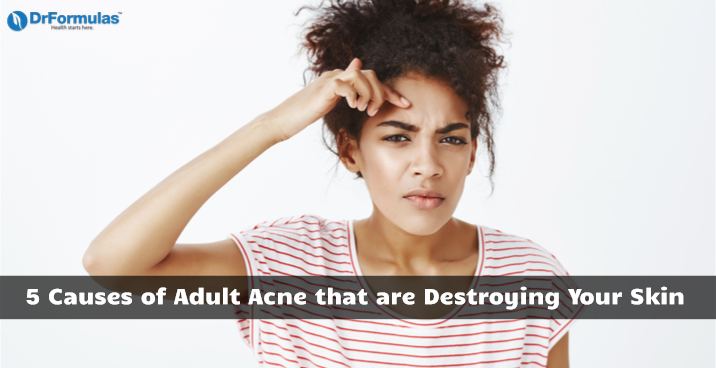
What Causes Acne?
Many people get the occasional pimple. But when skin breaks out in more than just a zit here and there, you might have acne. Learn more about acne, its causes, and what you can do about it below.
What Is Acne?
Acne is more than just a pimple or two. Pimples are a symptom of a skin condition known as acne, which happens when pores and hair follicles get plugged with sebum, an oily substance produced by your body, and dead skin cells. Sebaceous glands beneath the skin produce sebum, which travels along the shaft of hair in the attached follicle to the surface of the skin, where the oil exits through small holes called pores. Acne often causes whiteheads, blackheads, or pimples that typically appear on the areas of skin with the most sebaceous, or oil, glands: the face, forehead, chest, upper back, and shoulders.
- Blackhead: When bacteria and oil congest the pore, exposure to air causes the plug to turn brown.
- Whitehead: When the pore is plugged and does not open to the surface, the follicle wall might bulge, producing a whitehead.
- Pimple: These raised red spots, often with a white center, develop when blocked hair follicles are infected with bacteria or become inflamed.
- Cyst: Painful, cystlike lumps can form beneath the surface of the skin due to blockages and inflammation deep inside hair follicles.
Main Causes of Acne
The main factors that cause acne are:
- Excess oil production in the sebaceous glands
- Hair follicles that are clogged by sebum (oil) and dead skin cells
- Bacteria trapped in hair follicles and pores
- Imbalance of hormones that cause acne such as androgens and Insulin-Like Growth Factor 1 (IGF-1)
- Inflammation
What Can Trigger Acne or Make Acne Worse?
Hormones
Certain hormones are known to cause or worsen acne. For example, during puberty increasing amounts of hormones known as androgens increase sebaceous gland activity, causing them to produce more sebum (oil). Hormonal changes also occur during pregnancy and menses which affect sebum production and acne. Likewise, use of certain oral contraceptives can contribute to acne.
Diet
Interestingly, there is a relationship between diet, hormones, and acne. A hormone released after eating certain foods called IGF-1 has been found to cause acne. People who are less sensitive to IGF-1 have less acne.1 In the previous study people who weren't sensitive to IGF-1 had lower rates of acne compared to the general population. Following this line of thought, studies do suggest that meals rich in carbohydrates2 and protein3 cause IGF-1 levels which can trigger acne breakouts.
Stress
Stress aggravates acne by lowering the immune response, preventing your body from fighting against acne causing P. acnes bacteria. P. acnes plays a vital role in the formation of acne because it feeds off of sebum and produces pro-inflammatory molecules that clog pores.
Poor Hygiene
Hygiene does play a role in acne formation. Dirty skin contributes to clogged pores but excessive washing, harsh cleansing, and scrubbing too hard actually can also irritate the skin, making acne worse.
Medications
Certain medications aggravate acne such as steroids that suppress the immune system and hormonal drugs that interact with hormones such as oral contraceptives.
Addressing the Causes of Acne
Knowing these causes of acne will help you understand how treatments and remedies for acne work.
Hormones
As previously discussed, androgenic hormones increase sebum production and can worsen acne. The prescription drug spironolactone is often used by dermatologists for its anti-androgenic effects on acne. This means that the drug blocks the effects of androgens.
There aren't many herbal remedies with documented anti-androgenic effects except for diindolylmethane (DIM). What's interesting about DIM is that it has both anti-estrogenic as well as anti-androgenic effects. Its anti-androgenic effects may be helpful for those suffering from acne.
One of the best things you can do to help ensure that your hormones are well balanced is to try to maintain a healthy weight. In women a condition called polycystic ovarian syndrome (PCOS) causes abnormal menses, acne, insulin resistance (diabetes), hirsutism and acne. For this reason it is difficult to discuss acne remedies without discussing diet.
Diet
As we mentioned earlier, carbohydrate and protein consumption contribute to spikes in IGF-1 which contributes to acne breakouts. Switching to a low-glycemic index diet will help lower IGF-1 levels. A low-glycemic index diet releases carbohydrates into the body at a slower rate compared to a normal diet. Low carbohydrate diets may also be helpful but something to keep in mind is that in those diets carbohydrates are replaced with protein which can also cause IGF-1 spikes that worsen acne.
High fat diets may also exacerbate acne if the wrong types of fats are consumed. Diets rich in omega-6 oils are pro-inflammatory and can worsen acne by making inflammation worse. Inflammation plays a central role in causing acne.
Inflammation
Avoid picking at pimples which causes trauma and irritation which may worsen resulting scars. Pimple patches can help you cover up pimples and prevent you from picking at them.
Herbal remedies for inflammation include fish oil, turmeric, and other herbs. Fish oil is rich in omega-3 fats which are not inflammatory when compared to omega-6 fats commonly found in vegetable oils. Turmeric is another well-known anti-inflammatory agent that can reduce irritation.
Have a Good Acne Skincare Routine
Having a regular skincare routine consisting of a gentle, sulfate-free face wash followed by a non-comedogenic moisturizer will help keep pores clear of debris and promote normal levels of sebum production. Products that are too drying or irritating may actually cause increased oil production as the skin tries to maintain moisture.
Knowing the different causes of acne will help you to understand how to address acne at the root cause. With changes to your diet, skincare routine, and the way you deal with the occasional acne breakout, you can have clearer, better looking skin.
Sources:
1. https://link.springer.com/article/10.1186/1743-7075-8-41
2. https://www.nature.com/articles/ejcn2012107
3. https://www.sciencedirect.com/science/article/abs/pii/S0026049505003422


